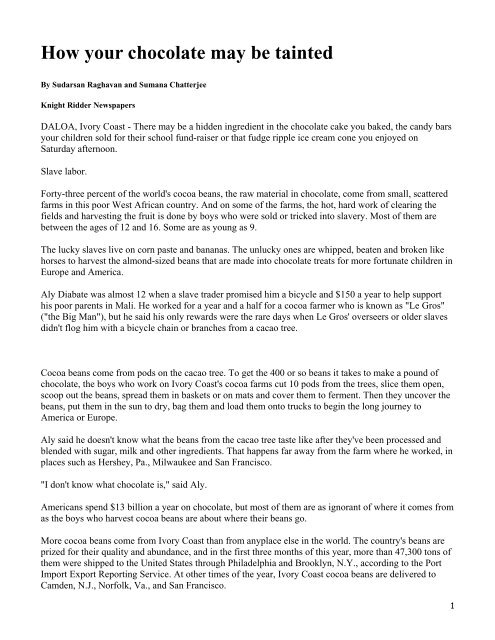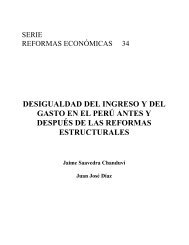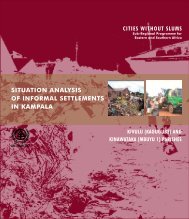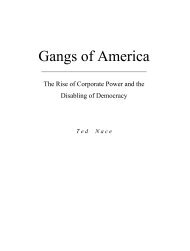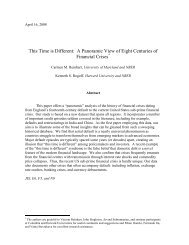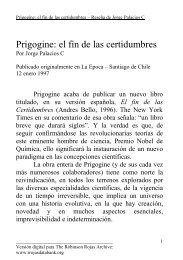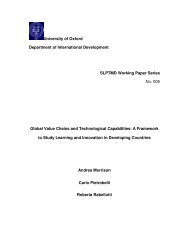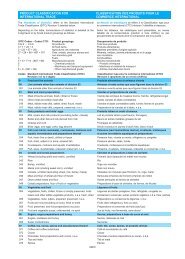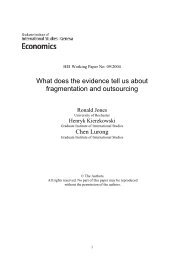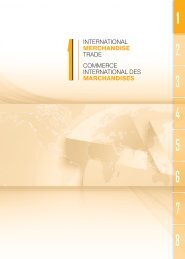You also want an ePaper? Increase the reach of your titles
YUMPU automatically turns print PDFs into web optimized ePapers that Google loves.
<strong>How</strong> <strong>your</strong> <strong>chocolate</strong> <strong>may</strong> <strong>be</strong> <strong>tainted</strong><br />
By Sudarsan Raghavan and Sumana Chatterjee<br />
Knight Ridder Newspapers<br />
DALOA, Ivory Coast - There <strong>may</strong> <strong>be</strong> a hidden ingredient in the <strong>chocolate</strong> cake you baked, the candy bars<br />
<strong>your</strong> children sold for their school fund-raiser or that fudge ripple ice cream cone you enjoyed on<br />
Saturday afternoon.<br />
Slave labor.<br />
Forty-three percent of the world's cocoa <strong>be</strong>ans, the raw material in <strong>chocolate</strong>, come from small, scattered<br />
farms in this poor West African country. And on some of the farms, the hot, hard work of clearing the<br />
fields and harvesting the fruit is done by boys who were sold or tricked into slavery. Most of them are<br />
<strong>be</strong>tween the ages of 12 and 16. Some are as young as 9.<br />
The lucky slaves live on corn paste and bananas. The unlucky ones are whipped, <strong>be</strong>aten and broken like<br />
horses to harvest the almond-sized <strong>be</strong>ans that are made into <strong>chocolate</strong> treats for more fortunate children in<br />
Europe and America.<br />
Aly Diabate was almost 12 when a slave trader promised him a bicycle and $150 a year to help support<br />
his poor parents in Mali. He worked for a year and a half for a cocoa farmer who is known as "Le Gros"<br />
("the Big Man"), but he said his only rewards were the rare days when Le Gros' overseers or older slaves<br />
didn't flog him with a bicycle chain or branches from a cacao tree.<br />
Cocoa <strong>be</strong>ans come from pods on the cacao tree. To get the 400 or so <strong>be</strong>ans it takes to make a pound of<br />
<strong>chocolate</strong>, the boys who work on Ivory Coast's cocoa farms cut 10 pods from the trees, slice them open,<br />
scoop out the <strong>be</strong>ans, spread them in baskets or on mats and cover them to ferment. Then they uncover the<br />
<strong>be</strong>ans, put them in the sun to dry, bag them and load them onto trucks to <strong>be</strong>gin the long journey to<br />
America or Europe.<br />
Aly said he doesn't know what the <strong>be</strong>ans from the cacao tree taste like after they've <strong>be</strong>en processed and<br />
blended with sugar, milk and other ingredients. That happens far away from the farm where he worked, in<br />
places such as Hershey, Pa., Milwaukee and San Francisco.<br />
"I don't know what <strong>chocolate</strong> is," said Aly.<br />
Americans spend $13 billion a year on <strong>chocolate</strong>, but most of them are as ignorant of where it comes from<br />
as the boys who harvest cocoa <strong>be</strong>ans are about where their <strong>be</strong>ans go.<br />
More cocoa <strong>be</strong>ans come from Ivory Coast than from anyplace else in the world. The country's <strong>be</strong>ans are<br />
prized for their quality and abundance, and in the first three months of this year, more than 47,300 tons of<br />
them were shipped to the United States through Philadelphia and Brooklyn, N.Y., according to the Port<br />
Import Export Reporting Service. At other times of the year, Ivory Coast cocoa <strong>be</strong>ans are delivered to<br />
Camden, N.J., Norfolk, Va., and San Francisco.<br />
1
From the ports, the <strong>be</strong>ans are shipped to cocoa processors. America's biggest are ADM Cocoa in<br />
Milwaukee, a subsidiary of Decatur, Ill.-based Archer Daniels Midland; Barry Callebaut, which has its<br />
headquarters in Zurich, Switzerland; Minneapolis-based Cargill; and Nestle USA of Glendale, Calif., a<br />
subsidiary of the Swiss food giant.<br />
But by the time the <strong>be</strong>ans reach the processors, those picked by slaves and those harvested by free field<br />
hands have <strong>be</strong>en jumbled together in warehouses, ships, trucks and rail cars. By the time they reach<br />
consumers in America or Europe, free <strong>be</strong>ans and slave <strong>be</strong>ans are so thoroughly blended that there is no<br />
way to know which <strong>chocolate</strong> products taste of slavery and which do not.<br />
<strong>How</strong>ever, even the Chocolate Manufacturers Association, a trade group for American <strong>chocolate</strong> makers,<br />
acknowledges that slaves are harvesting cocoa on some Ivory Coast farms.<br />
A 1998 report from UNICEF, the United Nations Children's Fund, concluded that some Ivory Coast<br />
farmers use enslaved children, many of them from the poorer neighboring countries of Mali, Burkina<br />
Faso, Benin and Togo. A report by the Geneva, Switzerland-based International Labor Organization,<br />
released June 15, found that trafficking in children is widespread in West Africa.<br />
The State Department's year 2000 human rights report concluded that some 15,000 children <strong>be</strong>tween the<br />
ages of 9 and 12 have <strong>be</strong>en sold into forced labor on cotton, coffee and cocoa plantations in northern<br />
Ivory Coast in recent years.<br />
Aly Diabate and 18 other boys labored on a 494-acre farm, very large by Ivory Coast standards, in the<br />
southwestern part of the country. Their days <strong>be</strong>gan when the sun rose, which at this time of year in Ivory<br />
Coast is a few minutes after 6 a.m. They finished work about 6:30 in the evening, just <strong>be</strong>fore nightfall,<br />
when fireflies were <strong>be</strong>ginning to illuminate the velvety night like Christmas lights. They trudged home to<br />
a dinner of burned bananas. If they were lucky, they were treated to yams seasoned with saltwater<br />
"gravy."<br />
After dinner, the boys were ordered into a 24-by-20- foot room, where they slept on wooden planks<br />
without mattresses. The only window was covered with hardened mud except for a baseball-size hole to<br />
let some air in.<br />
"Once we entered the room, nobody was allowed to go out," said Mamadou Traore, a thin, frail youth<br />
with serious brown eyes who is 19 now. "Le Gros gave us cans to urinate. He locked the door and kept the<br />
key."<br />
"We didn't cry, we didn't scream," said Aly (pronounced AL-ee). "We thought we had <strong>be</strong>en sold, but we<br />
weren't sure."<br />
The boys <strong>be</strong>came sure one day when Le Gros walked up to Mamadou and ordered him to work harder. "I<br />
bought each of you for 25,000 francs (about $35)," the farmer said, according to Mamadou (MAH-mahdoo).<br />
"So you have to work harder to reimburse me."<br />
Aly was barely 4 feet tall when he was sold into slavery, and he had a hard time carrying the heavy bags<br />
of cocoa <strong>be</strong>ans.<br />
"Some of the bags were taller than me," he said. "It took two people to put the bag on my head. And when<br />
you didn't hurry, you were <strong>be</strong>aten."<br />
2
He was <strong>be</strong>aten more than the other boys were. You can still see the faint scars on his back, right shoulder<br />
and left arm.<br />
"They said he wasn't working very hard," said Mamadou.<br />
"The <strong>be</strong>atings were a part of my life," Aly said. "Anytime they loaded you with bags and you fell while<br />
carrying them, nobody helped you. Instead, they <strong>be</strong>at you and <strong>be</strong>at you until you picked it up again."<br />
At night, Aly had nightmares about working forever in the fields, about dying and nobody noticing. To<br />
drown them out, he replayed his memories of growing up in Mali, over and over again<br />
"I was always thinking about my parents and how I could get back to my country," he said.<br />
But he didn't think about trying to escape.<br />
"I was afraid," he said, his voice as faint as the scars on his skinny body. "I had seen others who tried to<br />
escape. When they tried they were severely <strong>be</strong>aten."<br />
Le Gros (Leh GROW), whose name is Lenikpo Yeo, denied that he paid for the boys who worked for<br />
him, although Ivory Coast farmers often pay a finder's fee to someone who delivers workers to them. He<br />
also denied that the boys were underfed, locked up at night or forced to work more than 12 hours a day<br />
without breaks. He said they were treated well, and that he paid for their medical treatment.<br />
"When I go hunting, when get a kill, I divide it in half — one for my family and the other for them. Even<br />
if I kill a gazelle, the workers come and share it."<br />
He denied <strong>be</strong>ating any of the boys.<br />
"I've never, ever laid hands on any one of my workers," Le Gros said. "May<strong>be</strong> I called them bad words if<br />
I was angry. That's the worst I did."<br />
Le Gros said a Malian overseer <strong>be</strong>at one boy who had run away, but he said he himself did not order any<br />
<strong>be</strong>atings.<br />
3
A taste of slavery: Two boys, two years, no pay<br />
By Sudarsan Raghavan<br />
Knight Ridder Newspapers<br />
OUROUTA,Ivory Coast - Brahima Male and Siaka Traure met two years ago in the little bus station in<br />
Sikasso, Mali, where slave traders wait.<br />
Siaka was 14 and Brahima was just turning 12, and Siaka packed his nice olive green shirt <strong>be</strong>cause he<br />
thought he was going to have "a good time" in Ivory Coast.<br />
A "locateur" offered them work as welders or carpenters. Neither boy had any experience at those trades,<br />
but the locateur said his "big brother" in Ivory Coast would pay them each about $170 a year, 120,000<br />
African Financial Community francs.<br />
He offered to take them there for free.<br />
The two boys were taken to wait in a warehouse near the bus station for a few hours. More boys came,<br />
until there were 15. Then they drove off in two white mini-buses with two men in each vehicle.<br />
"The locateur told us that if we were stopped by police, we should tell them that he was our elder<br />
brother," said Siaka (pronounced See-AH-ka).<br />
When they neared the border, the boys were ordered to get out and take motorcycle taxis. They continued<br />
on a back road and slipped into Ivory Coast undetected. The taxis took them to a nearby village, where the<br />
w"I was suspicious, but I was also scared," said Brahima (Bruh-HEE-muh). "We were already across and<br />
I didn't know how I could run away. I had no money."<br />
Dote Coulibaly was waiting in Korhogo. He needed two boys to work on his cocoa and coffee farm.<br />
Coulibaly (COO-lee-baa-lee) said he bought Brahima and Siaka for $28 each, but the boys said he paid<br />
that much for both of them. Whatever the price, two days later they found themselves on his farm.<br />
"When we arrived, he had not told us the whole story," said Brahima. "He told us we would work only in<br />
the cocoa and coffee fields. But there were also cotton, yam, corn and rice fields. When you finish one<br />
field, you go to another and another."<br />
Nearly half of the world's cocoa <strong>be</strong>ans come from Ivory Coast farms, some of which use boys like<br />
Brahima and Siaka who were sold or tricked into slavery to do the harvesting.<br />
Brahima is a tall, thin boy with muscular arms and a cherubic face. He has <strong>be</strong>en enslaved on Coulibaly's<br />
farm nearly two years. He shares a windowless mud hut with Siaka, and he doesn't ask much from life. He<br />
just wants to leave.<br />
But he seldom thinks of trying to escape. When Siaka tried to flee last year, Coulibaly <strong>be</strong>at him, Siaka<br />
said.<br />
4
"He tied me <strong>be</strong>hind my back with rope and <strong>be</strong>at me with a piece of wood," said Siaka, peeling back his<br />
shirt to show the scars on his left shoulder and arm. "Then he took a small gun, and said, `I'm going to kill<br />
you and dump you in a well.' "<br />
Coulibaly denied that he <strong>be</strong>at Siaka. But he didn't apologize for intimidating and bullying Siaka and<br />
Brahima into submission.<br />
After all, he said, he paid $28 each for them.<br />
"If I let them go, I'm losing money, <strong>be</strong>cause I spent money for them," explained Coulibaly, 39, wearing<br />
grimy khaki pants and holding a machete. "It will hurt me to lose them. So when I have the feeling that a<br />
person is trying to run away, I find that person and ask them why they want to leave."<br />
"One day, Siaka tried to run away," he continued. "I sat him down and said, `If you really don't want to<br />
work, you give me my money and I'll let you go.' Siaka said, `I'm sorry, I'm sorry.' But I kept telling him<br />
Then I said, `You know I spent money on you. If you try to escape, I'll catch you and <strong>be</strong>at you.' After that,<br />
we were on <strong>be</strong>tter terms. He's never <strong>be</strong>en impolite to me since then. . . . I just frightened him."<br />
Coulibaly flashed a toothy smile and shrugged, as if he expected his visitors to understand.<br />
He feeds the two boys adequately, and he gave them $18 each to celebrate two Muslim holidays. They<br />
used the money to buy sandals and soap.<br />
But when their year was up last Septem<strong>be</strong>r, he told them that two of his relatives had died and he had had<br />
to pay for their funerals and other expenses. So could the boys please wait until January to <strong>be</strong> paid?<br />
When January came, Coulibaly said he would pay them at the end of this year. But he admits he <strong>may</strong> have<br />
a hard time raising the $680 he owes them for two years' work. Last year, he made only $570, and the<br />
economy is getting worse.<br />
"These days you cannot make predictions anymore," said Coulibaly.<br />
He doesn't watch the boys as closely now. Since he owes them money, he knows they won't run away.<br />
"If you leave, you are the loser and he'll <strong>be</strong> happy," said Brahima, his voice fading in the rustle of the<br />
wind.<br />
So Siaka and Brahima never venture very far from their master's farm.<br />
"Daloa is Paris to us," said Brahima, as he sat <strong>be</strong>side a big red termite hill and watched Siaka work in the<br />
olive green shirt he had brought for the good times in Ivory Coast. It is in tatters.<br />
5


